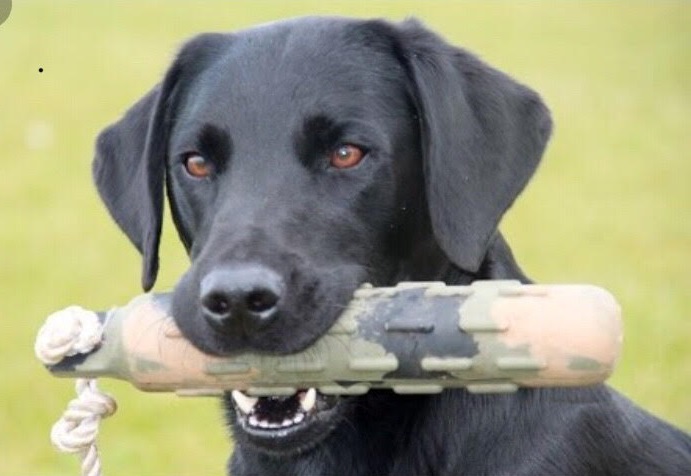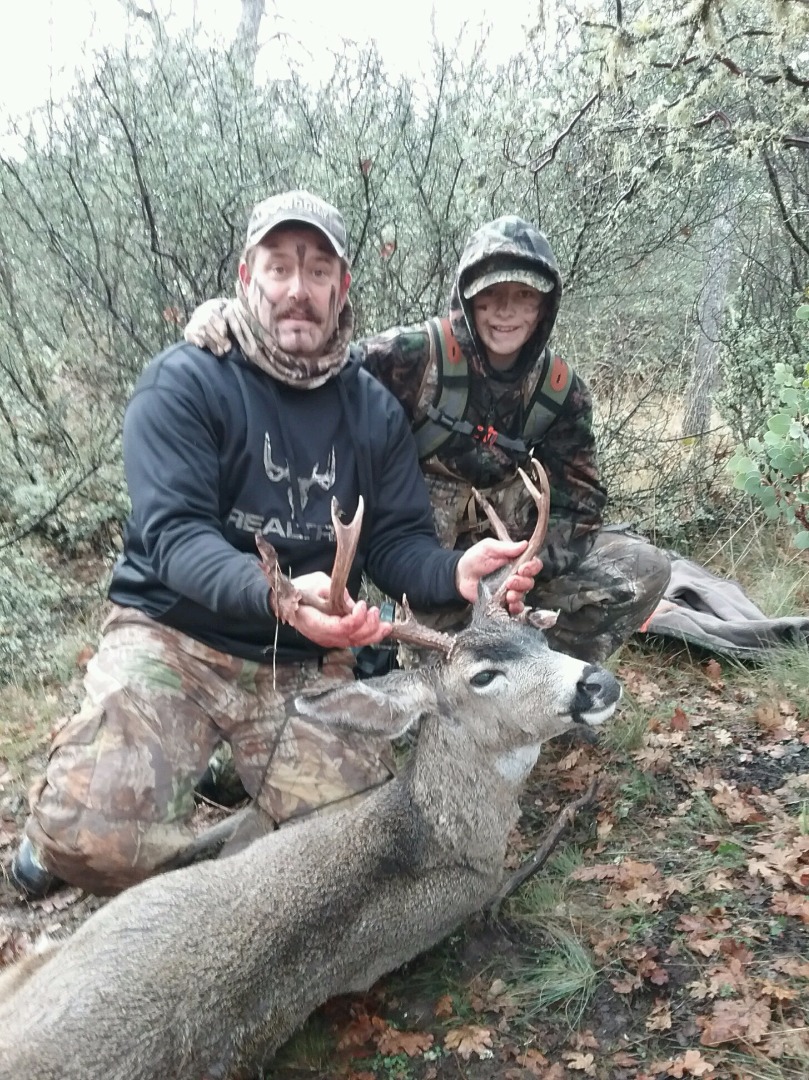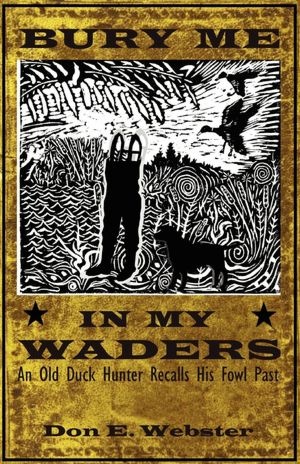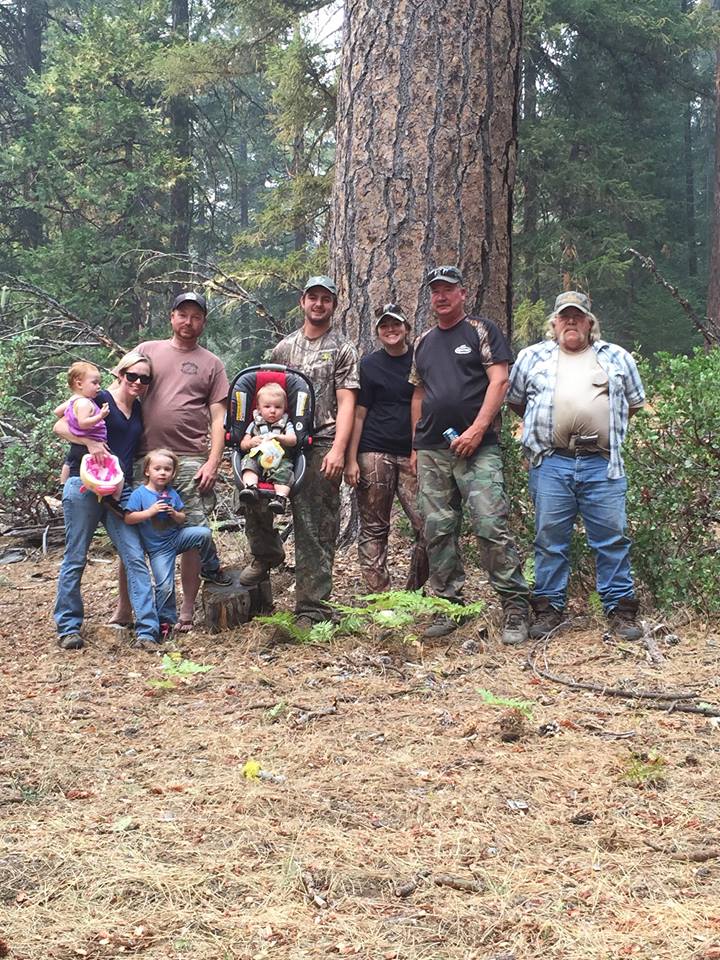Fish Report for 11-12-2017
My Best Friend Always Wears a Fur Coat

by Don E. Webster
11-12-2017
Website
Like many waterfowlers, I’ve been around hunting dogs as long as I can remember. More than likely, when I came home from the hospital as a newborn, there was a hunting dog of some sort riding with me and my mother in the back of my grandfather’s 38 Plymouth sedan. The first hair to grace my bald, infant scalp was probably dog hair.
When I was born my father was in Europe fighting Adolf Hitler’s bunch. My mother and I lived with my grandparents for the first two years of my life. My grandfather ran a little dairy out in the country on about 40 acres.
When my father returned from the war in 1945, we lived in a travel trailer on the dairy farm for four more years until my dad eventually built our home.
After we moved into our new home, I still spent most weekends and holidays on the dairy farm.
On the dairy, in addition to cows, there was always a variety of other farm animals running around. When you stepped off the back porch, you might scatter a bunch of chickens, shoo away a lamb, a pig, a goat, or that ornery old tom turkey that knocked me down when I was three years old and stomped the daylights out of me. I was the last thing old tom ever stomped because my grandpa blew his head off with his Stevens pump gun. Grandpa was kind of partial to me.
Inky never had the benefit of any bona fide training. The only instruction he received was in the way of verbal orientation. The verbal orientation consisted primarily of informal commands from my grandfather, such as “go get that duck, you mangy cur or I’ll beat you to a pulp, and then I’ll beat up on the pulp!”
Grandpa didn’t really have to yell at Inky. He just liked to sound off at the dog the way my grandma sounded off at him when she got mad at him, which was fairly often. Inky was a phenomenal retriever.
Lord only knows what he could have done if he’d been properly trained. I once saw him retrieve seven downy mallard ducklings out of a slough for my grandpa, and not so much as one strand of damp down was out of place when he placed each duckling in my grandfather’s hand. On another occasion, my grandfather jumped a flock of teal out of the creek. He dropped four birds with the old Stevens pump, and two of the birds were cripples. Inky brought all four birds back in two trips, two teal at a time, after chasing down the two cripples.
I don’t have the faintest idea what Inky’s lineage was, but judging from a couple of old photos I have, I’d say he was purebred. Out of the five duck dogs I’ve had in my family, Inky was the best natural retriever of them all. Unfortunately, he was also a lady’s man. If there was a bitch in season within two square miles of the dairy, Inky would hat up and be gone, sometimes for two or three days. It turned out to be his undoing.
He came gimping home one morning, and when my grandpa examined him, he determined Inky had been shot several times with some kind of .22 firearm. Inky died the next day. He was five years old. I’m not ashamed to admit that I cried my eyes out.
Although we had a few dogs in the family after Inky, the next, real duck dog didn’t follow until I came home from Vietnam. I bought an English Labrador through the mail. He came from a reputable kennel in Illinois. They flew him out to California, and I picked him up at the big airport in San Francisco. When I opened up the shipping crate, there was more poop in it than puppy.
I cleaned the little guy off as best I could, but I had to keep the windows rolled down all the way home.
My new pup’s name was Boomerang. Boomer for short. I got a copy of James Lamb Free’s book on retrievers and went to work with my new duck dog. The first thing I noticed was that the dog was doing a better job training me than I was training him. After awhile, I got the hang of it, and Boomer turned out to be a solid, steady retriever. I field-trialed him for two years. He took some ribbons. He wasn’t too hard on the eyes, either. I showed him long enough to earn quite a few points toward his bench championship before I lost interest in the whole affair.
If Boomer had a shortcoming, it was that he wasn’t a fast-working dog. His greatest assets were his nose, and his perseverance. Many times, he would enter cattails or bulrushes so thick a hunter couldn’t penetrate them in search of a downed duck. Sometimes he’d be gone so long I’d start to worry about him. Sooner or later, he’d emerge with the duck, whether it be dead or alive. He just wouldn’t give up until he found the bird.
I left Boomer with my parents once when I went on an extended trip somewhere. When I returned, I thought I was going to have to fight my father in order to get my dog back. My dad had been dragging limbs out to the street from two trees he’d been trimming in the backyard. With no instruction, Boomer helped him, and according to my father, he hauled more limbs to the street than my dad. My father was quite attached to him.
Perhaps Boomer’s greatest accomplishment was a particular pup he sired. I bred him to a registered bitch who was part of a kennel of 12 Labs owned by an acquaintance of mine, a fellow who worked for the Department of Fish and Game as a wildlife biologist. He lived in the high country in the eastern Sierras.
I dropped Boomer off at his kennel. When I phoned two days later, the breeder informed me that the two dogs had bred successfully, although Boomer being a rookie, had tried to make love to the wrong end of his lady friend.
She was repulsed, and pushed him off a cliff above the kennels. The only thing damaged was his pride.
I had first pick of the litter. When the time came, I contacted my long-time friend and hunting pal, Walt Grossman. I told him I had a Lab puppy for him, and that it was a gift. No strings attached. For me, it was just a small token of appreciation for everything Walt and “Pop” Grossman had done for me over the years. Pop was a second father to me, and Walt was like a brother.
We drove to the kennel together, and Walt picked out a pup that appeared to be a little demon. He was a real live wire. Walt, being a fan of western movies, named the pup Chance. He trained the pup himself, but as Walt would confess, he really didn’t have to work too hard training Chance. Chance was one of those dogs that only comes along once in a lifetime, if you’re lucky. Not only was he an amazingly natural retriever, he was possessed with inborn self-discipline, and instincts requiring virtually no fine-tuning. On a scale of one to ten, his desire to retrieve was around 20. Chance lived to hunt, and for nothing else.
Walt kept his dog in an area behind the house that he’d fenced off and made into a kennel with a short run. The family used the door between the house and the unattached garage as the main way of entering and leaving the home. The back wall of the house was part of Chance’s kennel run. He could peek through the fence and see anyone coming or going by way of the side door of the home.
When Walt went hunting, he almost always came out that door. The problem was that anytime Chance saw Walt going out that door, he thought Walt was going hunting. The way Chance saw it, where could anyone possibly be going other than hunting? As a result, Walt tried to become adept at sneaking out of the house. He WD-40’d the door lock and hinges, and sometimes even removed his shoes when leaving the house. Chance usually busted Walt about eight out of ten times. Walt would drive away, and any poor soul remaining in the home would have to listen to Chance howl for a minimum of two hours. The neighbors finally had a belly full of it and called the police. Walt began using the front door of the house.
I could write an entire chapter detailing Chance’s retrieving exploits. I’ll describe two, and let them suffice. The first time Walt took Chance on a genuine hunt, I was with him. We jumped some mallards out of a wide, deep slough. The distance from the bank down to the water was at least 10 feet. We dropped three ducks, one of which had a broken wing, and it swam across to the far side of the slough and disappeared into some brush. Chance was not quite a year old at the time.
Without being commanded, he launched himself off the bank and disappeared completely from sight when he hit the water. He came up swimming, picked up the first duck and took it to Walt.
Walt had gone about 50 yards down the slough and found a place where he could get down to the water. Chance went back, picked up the second dead duck and repeated the process. Walt tried to coax him out of the water, fearing that the young dog had expended his energy. No dice. Chance turned, crossed the slough, and spent a good five minutes looking for the cripple until he located it and chased it down. He brought it to Walt, climbed out of the slough, shook himself, and panted eagerly, wanting more. We just stood there, gaping in disbelief. “That ain’t just a dog,” I said.
“What is it, then?” Walt asked.
“I’m not sure, but if I ever run across another one, I’m keeping it for myself.”
Walt took Chance out to the delta toward the end of the season that same year. The channels in the delta are big water, and the current can be strong at times, depending on how the tide is running. Most of the channels are a minimum of 100 yards wide, and many are much wider. Walt knocked down a white-fronted goose while pass shooting from the levee and it fell in the channel. Chance plowed into the water after the goose as it drifted rapidly away. By the time he reached the bird he’d swum almost 200 yards down the channel, with Walt trying to call him off the bird the whole time.
While Walt called and encouraged him frantically, he turned and swam across and against the strong current at least 100 yards to shore.
Chance died from leukemia before his fourth birthday, ahead of his sire, Boomer, who lived 11 years. Maybe somewhere deep down in Chance’s canine genes, he knew his days were numbered, and he decided to make the most of them. His fire burned brighter because he knew it was going to be extinguished sooner. He’s been gone for many years, and even to this day, it’s difficult for Walt to talk about Chance. We don’t reminisce much about him.
After my old pal Boomer died, my wife eventually grew weary of hearing me talk about him, and about Chance. She secretly contacted the breeder of the two dogs, and when my birthday rolled around, I received a Lab puppy as a present.
The pup was a yellow dog, and we named him Tanner. Tanner grew into one of the most beautiful Labradors I’ve ever seen. He was all Lab, as friendly as they come, adoring attention, and minding fairly well. Tanner had two shortcomings. He was not very bright. And he loved to jump. He could stand flat-footed, jump, and reach the top of a fence over six feet high. He would then grab hold of the top of the fence and vault the rest of the way over. He was virtually incapable of accepting retriever training. He lacked a desire to chase anything, much less bring it back. It was all I could do to get him to chase after a fresh, bloody bone.
One fine spring day, Tanner vaulted over the fence and right out of our lives.
I scoured the streets for hours, placed ads in the paper, made phone calls, posted flyers, and none of it worked. Someone found Tanner who probably admired his friendliness and good looks more than they listened to their conscience.
The whole experience with Tanner left me with a bad taste in my mouth. I went for over two years before I was bitten by the dog bug again. One day while casually browsing the classifieds, I ran across an ad in the “dogs for sale” column. It said they were Lab pups and they came from Canadian hunting stock, and that they had to be sacrificed due to a family tragedy. The ad aroused my curiosity and interest. As I drove out to talk to the owner of the puppies, I hoped my interest and curiosity were not based on morbidity.
It turned out the woman who had placed the ad had lost her husband in a horrible auto accident. In fact, the squashed remains of the vehicle had been dropped off at the residence and it was setting in front of the house. It looked like it had been run through one of those automobile compactors.
The woman had one black male pup left and she was selling it for one hundred dollars. She told me she hadn’t registered the pups because the bitch had been bred by two different males, both papered.
I got a good look at the dam and both of the dogs, and they were big, good-looking canines. I bought the pup and named him Deke. Deke turned out to be a big dog, weighing close to 100 pounds. I can describe Deke with one word. Gentleman. He was the best family dog we’ve ever owned. From day one, he never chewed. He never dug. It was all he could do to bring himself to bite fleas. He was great with kids, anybody’s kids. The gas and electric meter reader fell in love with him. The phone guy and the pool guy fell in love with him. They all brought him treats. My wife habitually told me that I might learn a thing or two by observing Deke’s behavior more closely.
Deke was not a whirlwind as a duck dog, but he would manage to get the job done. The odd thing about him was that in spite of having a wonderfully dense coat, Deke just didn’t particularly care for water. What? A purebred Lab that doesn’t like water? Preposterous. Unthinkable. Well, believe it. I think that by asking Deke to go into frigid water, he looked upon it as something one gentleman simply should not ask of another gentleman. It just wasn’t polite.
Let that unsavory task be relegated to hounds of lower social standing and caste.
Deke’s strong point and his sincere hunting desire was centered on upland birds. He loved pheasants, quail, grouse, chukars, and doves. On more than one hunt, he retrieved at least 100 doves for the entire group of hunters in a day’s outing. He was adept at finding ruffed grouse in thick cover. It may well have been that Deke thought he was a Brittany spaniel in a rare color phase with an abnormal growth hormone.
Deke was put to rest at the age of seven with a rapidly metastasizing cancer.
Our family shed tears for days over him.
A week after his passing, we received a card from the veterinarian, a nice lady who wrote that Deke was an absolute gentleman to the very end. Even during his final moments of life, he still had people falling in love with him.
My former work associates knew how much me and my family loved Deke, and how much we missed him. So, they did what in their minds was the right thing to do. They surprised us with the gift of a new, Lab puppy. The fellows who contributed their hard-earned dollars toward the purchase of our new pup worked at a local Chevrolet dealership. Out of respect and appreciation for them, we named the female Lab Chevy.
Chevy was the antithesis of Deke. First off, she was a female. Then there was the problem with chewing. And digging. And more chewing and endless digging. She took to jumping on my wife, who finally admitted in a fit of rage that she would like to kill the animal.
After calming down and taking something out of the medicine cabinet in the bathroom, she murmured incessantly about how much she missed Deke. Dear old Deke spoiled her for good.
It wasn’t all bad with Chevy. She was by far the most alert dog I’ve ever owned. She missed nothing. If a grasshopper twitched its legs in the grass 50 yards away, she was all over it. She was a ball of fire at retrieving. She thought she knew more than I did. And in some ways, she did. I saw in her some of the best qualities I’d seen in Boomer and Chance. She was easy to train.
Once she left her puppy stage behind, she was eager to please and took discipline easily. Pure and simple, the dog could hunt.
Chevy’s still with us, and has slowed down quite a bit, but my wife is happy about that. She admits to liking the dog now.
Chevy will never replace Deke in her eyes, but I’ve caught her sneaking Chevy treats, and actually doting on her. That speaks volumes for both of them.
A duck dog, or any dog kept as a family pet, can be anything from an invaluable asset to a grandiose pain in the neck. On any given hunt, they’re usually both, and everything in between. They require more than a small amount of time and financial expenditure for life. Like all revered, family members and close friends, they provide companionship, support, and enjoyment, and when they pass they leave you with a hole in your heart.
They possess a quality many human beings lack. They love unconditionally. They’re supremely worthy of the best treatment we can give them, and any conduct by us involving them that does not approach that standard should be regarded as grossly negligent, if not criminal.
Training a hunting dog is more personally instructive and enlightening than just about anything institutions of higher learning have to offer. Gradually, you discover that you, not the dog, are the one benefiting the most from the training. You’re learning things about yourself. You’re discovering that you lack patience. You’re finding out that you still haven’t mastered self-control.
You’re realizing that the dog isn’t learning fast enough because you’re incapable of teaching it to that extent. The dog, if you allow it to, will eventually teach you how to be a patient, thoughtful, considerate, and capable human being.
In the process, you’ll end up with a loyal companion who will do most of your dirty work for you, and love you like there’s no tomorrow up to and including the day they die.
How many people do you know who will give you that every day in exchange for a pat or two on the head and some dry meal?
[Editor's Note: This article and many more like it can be found in Don E. Webster's book shown above.]
Don E. Webster has been an avid outdoorsman for over 60 years. In addition to being a columnist for MyOutdoorBuddy.com, Don has published three books: "Bury Me In My Waders" An Old Duck Hunter Recalls His Fowl Past, "Double-Ought Buck" a novel, and "Bears, Beer, Trout Tacos, Etc." Short Outdoor Tales & Other Quasi-Kindred Illuminations. Webster's books can be purchased on Amazon, Kindle, and Barnes & Noble Bookstores.
Webster's MyOutdoorBuddy column entitled "Canine Comics" won the Phil Ford Humor Award from the Outdoor Writers Association of California in 2013. Today, Webster's award winning articles and many more can be found on his MyOutdoorBuddy column page, The Outer Edge. You can also follow Don E. Webster on his Author's Facebook!
He continues to love fox squirrels and hate eucalyptus trees.
Photos
< Previous Report Next Report >
< Previous Report Next Report >
More Reports

11-8-2017
Cory Page (50), of Phoenix, and his son, Eli do things the old fashioned way. They hunt when their busy work...... Read More

Website Hosting and Design provided by TECK.net

